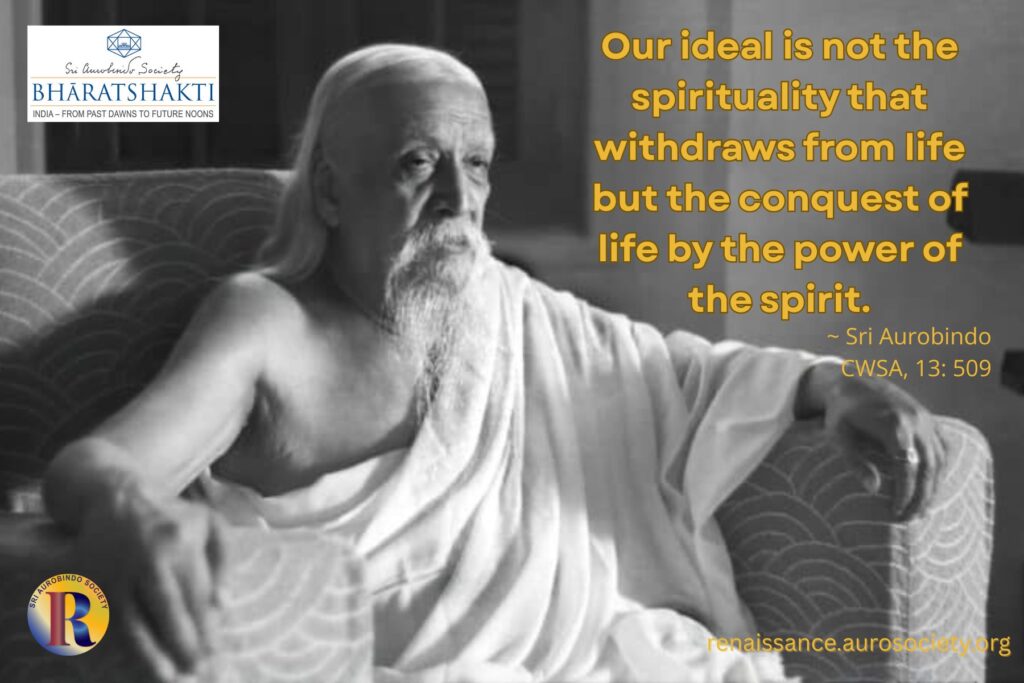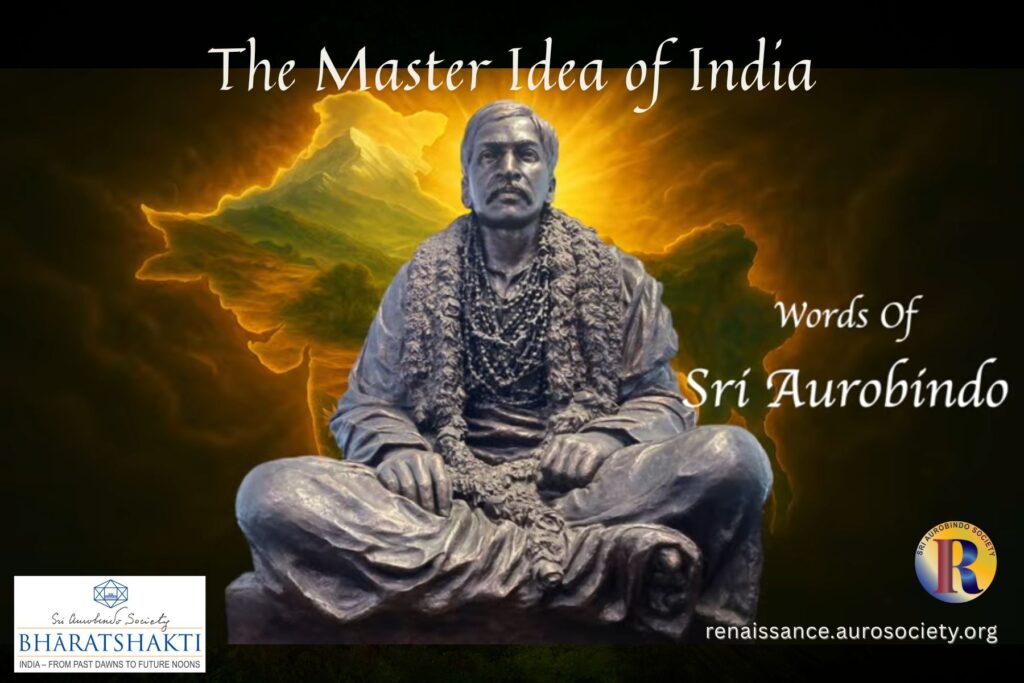Continued from PART 1
India’s Mission
History points out that each nation, each race has a unique character, a unique culture. And conquest and aggression which sets Europe apart has never been the grain of our being. The point is made by Swami Vivekananda when he remarks:
Each race has a peculiar bent, each race has a peculiar mission to fulfil in the life of the world. Each race has to fulfil its own mission. Political greatness or military power is never the mission of our race; it never was, and, mark my words, it never will be.
But there has been the other mission given to us, which is to conserve, to preserve, to accumulate, as it were, into a dynamo, all the spiritual energy of the race, and that concentrated energy is to pour forth in a deluge on the world whenever circumstances are propitious.
Let the Persian, or the Greek, the Roman, the Arab, or the Englishman march his battalions, conquer the world, and link the different nations together, and the philosophy and spirituality of India is ever ready to flow along new-made channels into the veins of the nations of the world.
The Hindu’s calm brain must pour out its own quota to give to the sum total of human progress. India’s gift to the world is the light spiritual.
~ Complete Works of Swami Vivekananda, Vol. 3, p. 109
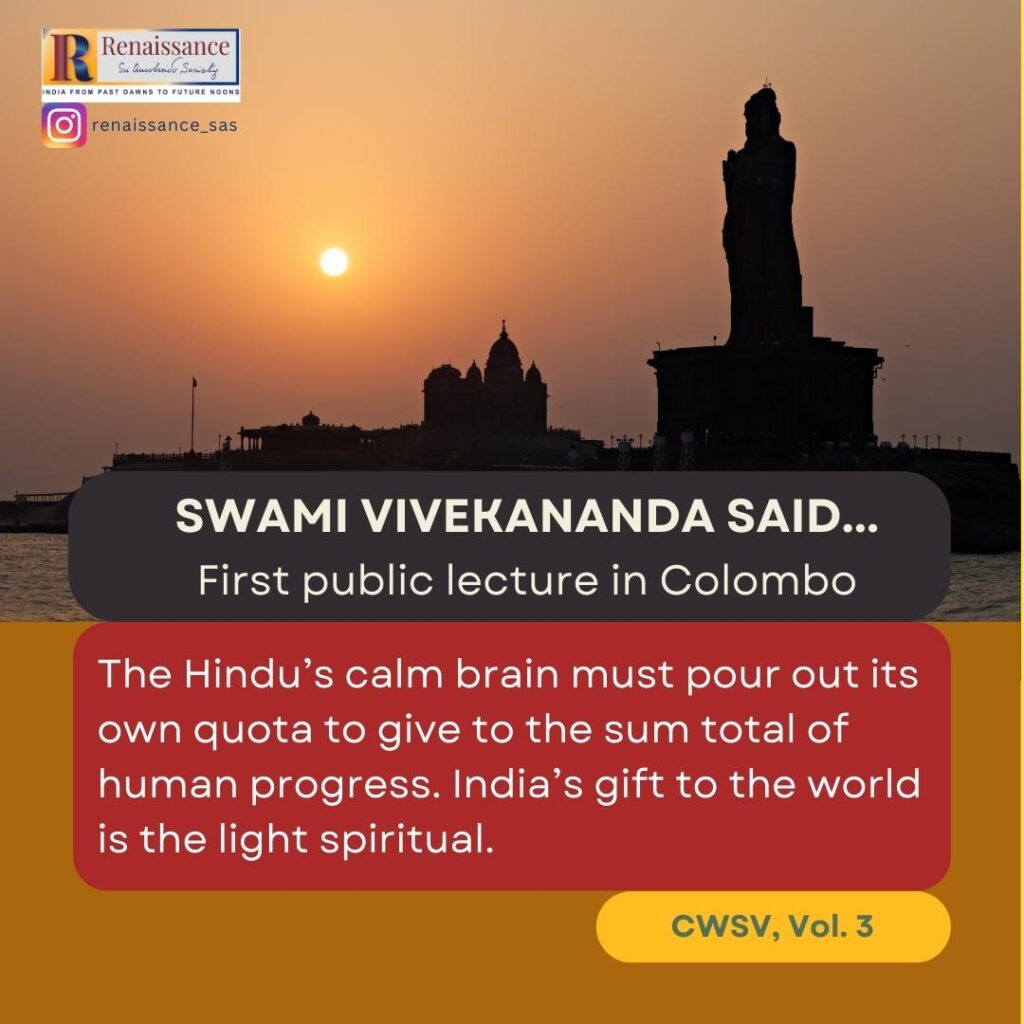
The Light of the Spirit
Yes, India’s gift to the world is spiritual light.
That is why spiritual knowledge was the highest value for us. Not power, not conquest, not world dominion. Because Europe had these as its guiding lights, its history is bespattered with blood. The historian Edward Gibbon remarks, “History is chiefly a record of crime.” Why is it so? Because if we leave out of European history all the wars and mass murders to build empires, the cruelties and the persecutions – there won’t be much history left to write!
In fact, we feel tempted to ask whether this gory history can be termed as “civilization” at all! It is reported that when Gandhi was asked about what he thought about the Western civilization, he had answered with an acid tongue, “It would be a good idea!” Though Gandhi’s sarcasm may appear to be harsh, there’s much room for introspection here as to why the history of Europe is a record of crime. And the answer simply is: Europe worshipped power.
In contrast, India worshipped spiritual knowledge.
Again, it is in India that the persecution of our prophets or the men of God is almost unheard of. We have never killed seekers of God because what they said or taught did not suit our preference or convenience. Crimes like crucifixion or burning at the stake for expressing truth are alien to our culture.
The Universality of Sanatana Dharma
Indian mind has always welcomed new light and tried to assimilate it with the wealth of spiritual knowledge and experience bestowed upon us by our sages and seers over millennia. Indian soul has always aspired to live up to the Truth and Light the enlightened masters have brought to this punya bhoomi. We believe such men are the manifestations of God on earth, we treat them as Avatars.
Even a person like Buddha who denied the Vedas, who rose as a rebel against the ritualism and priest craft of the later Vedic age, who propagated an atheistic religion was not condemned as a destroyer of our religion. He was rather seen as an Avatar who came to fulfil; not to destroy. The Puranic ages even made him a part of the pantheon of Hindu Gods and declared him to be the ninth Avatar of Vishnu. This is the catholicity, the universality of Sanatana Dharma.
The prophets in the Western world were not so fortunate. Whenever they appeared and proclaimed a new Truth, the established organised structures of power felt threatened and sought to eliminate them.
Socrates had to drink the hemlock because of his criticism of the Athenian polity. Mansur al Hallaj was dismembered limb by limb because of his supposed blasphemy for uttering Anal Haq (I am the Truth). Joan of Arc was burnt at the stake as a witch because she claimed to be inspired by divine voices. Galileo had to face the Inquisition because he published a book stating that the earth goes round the sun!
The trial and crucifixion of Jesus is the measure of ignorance and hostility of a society that worships nothing but power. This painfully tragic habit of mankind of putting the men of God to death repeatedly, has been poignantly expressed by Sri Aurobindo:
It turns against the saviour hands of Grace;
~ Savitri, Book I, Canto I, CWSA, Vol. 33, p. 7
It meets the sons of God with death and pain.
[. . .]
Their sun thoughts fading, darkened by ignorant minds,
Their works betrayed, their good to evil turned,
The cross their payment for the crown they gave
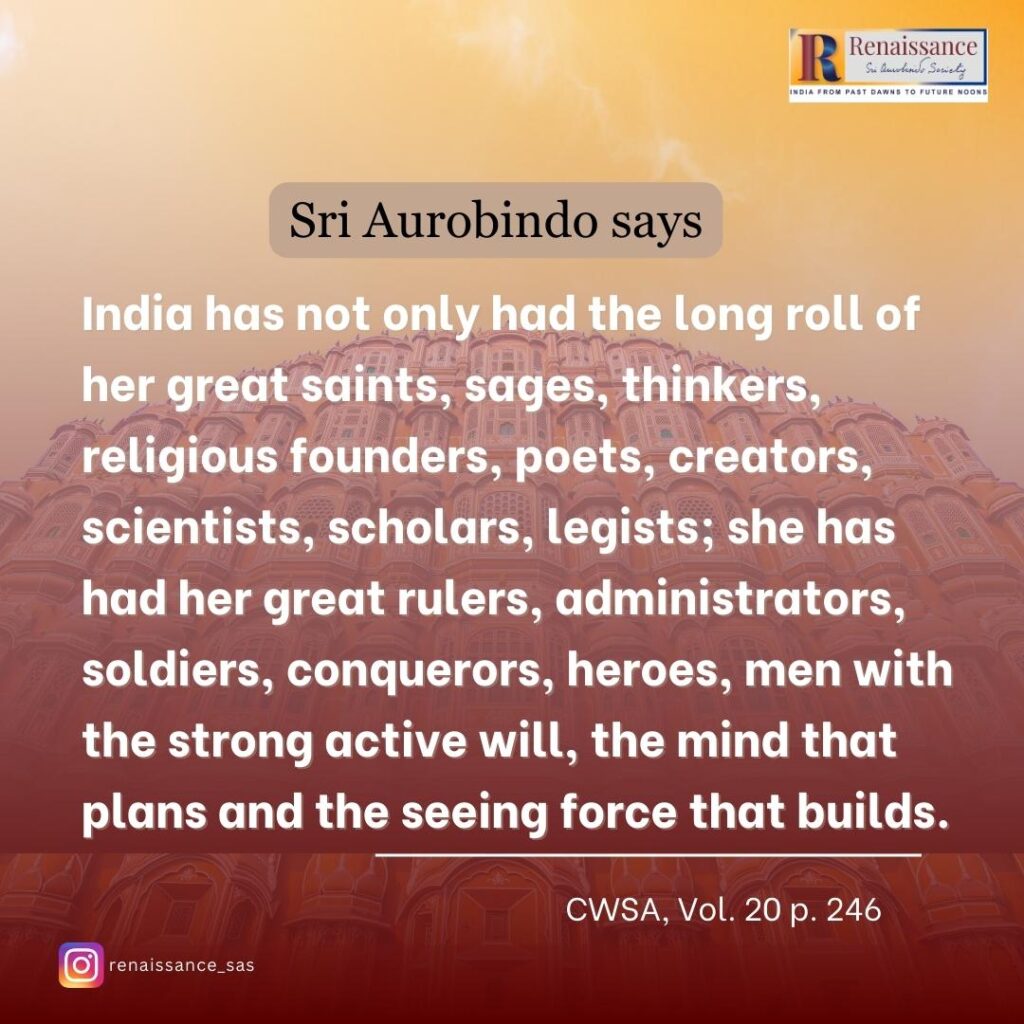
Of Warriors and Rishis
Yes, we Indians are not the ones who conquer nations. We are not the ones who launch a thousand ships to colonise other nations. India has hardly ever sent its armed battalions beyond its borders to conquer alien lands. But that doesn’t mean that we have been weak and effete.
After conquering the entire Middle East where he hardly met with any opposition when Alexander came to India, he had to face the spirited opposition of a small provincial kingdom ruled by Porus. Alexander was fascinated by the bravery of Porus and wondered at his fearlessness and dignity in the face of death and defeat.
India had its share of brave hearts who built great empires – Harsha, Chandragupta Maurya, Ashoka, Krishna Devaraya and the Maratha lion Shivaji who wore down the mighty empire of the Mughals with his relentless guerrilla warfare. India had no dearth of heroes.
But India has always worshipped the saints and not the kings.
In India, we did not glorify and pay tribute to the Caesars and the Napoleons. Rather the highest worship was reserved for the Rishis and the Buddhas.
Plato’s Republic speaks about an ideal state or Utopia which would be ruled by a philosopher-king. But Plato’s ideal had never come to fruition in the Western world. Perhaps the Roman emperor and Stoic philosopher Marcus Aurelius was the only one who ever came anywhere close to that ideal.
But in India, this ideal was realized many times over, but with a slight modification. The philosopher-king did not materialize in the person of a single individual, but our history is witness to many instances where the king sought guidance from a spiritual mentor. Thus, Chandragupta had his Chanakya. Both Ashoka and Harsha drew their philosophical guidance from the teachings of the Buddha. Shivaji had his Ramdas and Krishna Devaraya his Tathacharya.
This leaning towards spiritual light was something that was ingrained in the very nerves and sinews of this nation. Hence even the all-powerful kings had no hesitation to bow down before a man of knowledge, the spiritual guide, the guru.
The philosopher-king ideal of ancient Greece was realized in India. And in India we have also had the ideal of Rajrishi (Raja plus Rishi); this was extolled in our scriptures. King Janaka was held as an ideal king in our mythology because he was a king as well as a sage.
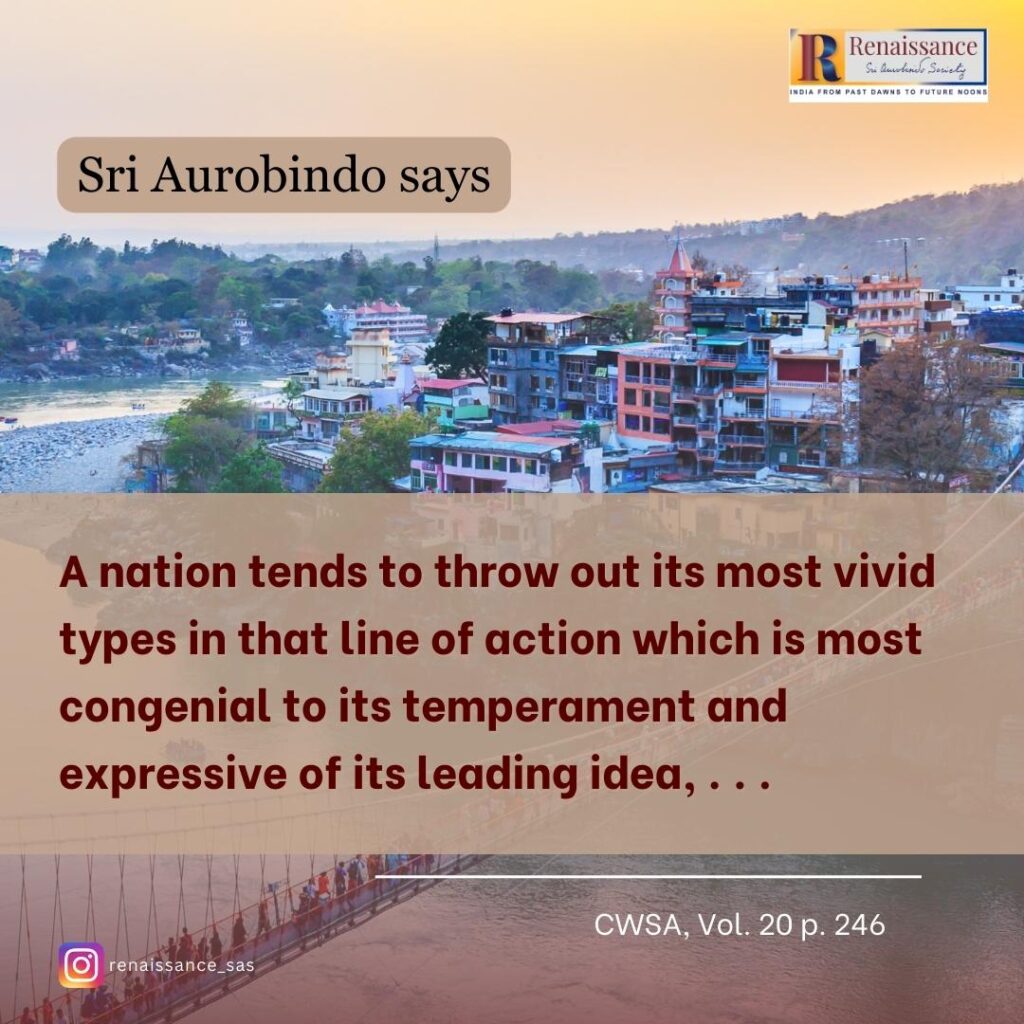
The Future of India
However, the journey of India has not been a path of roses but rather a path strewn with brambles and thorns. We have suffered wars and invasions by aggressors from beyond our borders for centuries. The Greeks, the Parthians, the Huns, the Islamic invaders, the yoke of the Mughal and British rule – we have endured them all.
India’s greatest strength has been its power of assimilation. The ability to accept and absorb all the diverse ways of life has been the national character of this land. Because we live and breathe the truth of jato mat, tato path (As many views, so many paths).
Yes, conquerors and aggressors had come from beyond the borders but we have been able to assimilate even what they had to give to us and made it a part of our national body. And we have never given up one thing: our commitment to spiritual knowledge and all the values that proceed from it – gentleness, humility, tolerance and the ability to endure all adversities.
And that is why we live. This is the secret of India’s survival.
Amazingly, the ancient soul of the nation still lives, despite all the outer evidence that may seem contradictory to our surface view. With regard to what lies in store for her in the future, no more luminous words have been spoken than the following by Sri Aurobindo:
India still lives and keeps the continuity of her inner mind and soul and spirit with the India of the ages.
Invasion and foreign rule, the Greek, the Parthian and the Hun, the robust vigour of Islam, the levelling steam-roller heaviness of the British occupation and the British system, the enormous pressure of the Occident have not been able to drive or crush the ancient soul out of the body her Vedic Rishis made for her.
[. . .]
India of the ages is not dead nor has she spoken her last creative word; she lives and has still something to do for herself and the human peoples.
And that which we must seek now to awake is not an anglicised oriental people, docile pupil of the West and doomed to repeat the cycle of the Occident’s success and failure, but still the ancient immemorable Shakti recovering her deepest self, lifting her head higher towards the supreme source of light and strength and turning to discover the complete meaning and a vast form of her Dharma.
~ CWSA, Vol. 20, pp. 431-444
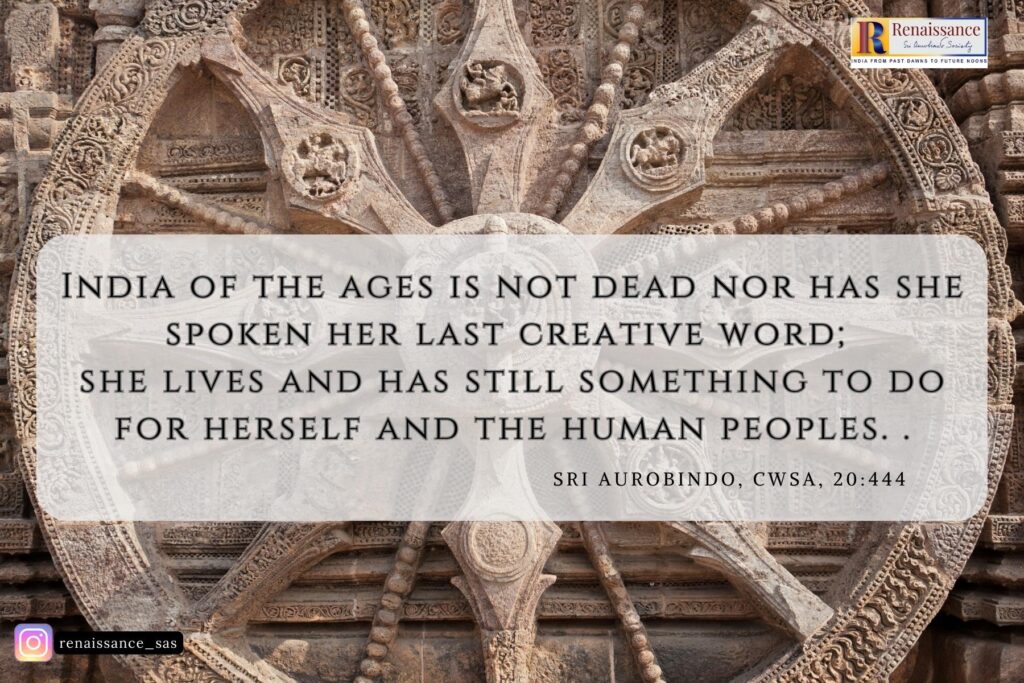
Read PART 1
~ Design: Beloo Mehra

